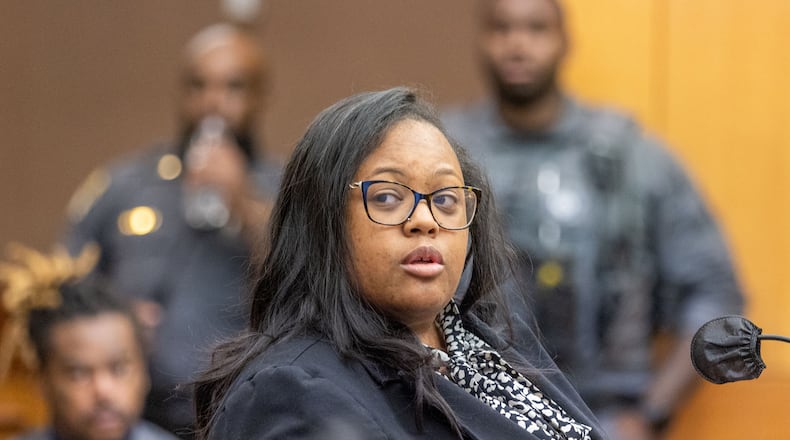A public spat between the head of Georgia’s public defender system and her rank-and-file attorneys over inadequate pay in the high-profile trial involving Atlanta rapper Young Thug and his alleged affiliates has exposed flaws in the state’s push to prosecute more gang members in large sprawling cases.
The wide-ranging prosecution of alleged Young Slime Life (YSL) members has required the state to contract with numerous private attorneys to help cover the case that has paralyzed parts of the Fulton County court system since the trial started in January.
The dispute over lawyer pay has added another chapter in a trial that at times has resembled a courthouse soap opera. The trial, on its current pace, could last more than a year — making it the longest in state history. The state-contracted attorneys in recent weeks complained publicly that the $15,000 the Georgia Public Defender Council (GPDC) was paying for that work has strained their private law practices.
Contract attorney Angela D’Williams has been the most vocal. She filed a legal motion in April complaining about the “egregiously low” wages which often amounted to less than minimum wage.
“I can’t take any new cases. I can’t close any cases. I just need something to survive off of,” D’Williams said earlier this month.
The public fracas exposes challenges to the court system as the state pushes to crack down on gangs. To realize their tough-on-crime campaign promises, district attorneys and Republican leaders such as Gov. Brian Kemp and Attorney General Chris Carr have leveraged millions of state dollars to hire prosecutors and investigators in an effort bring more complex gang cases to trial. The success of these measures can mean dozens of defendants can come to trial at once.
Credit: Miguel Martinez
Credit: Miguel Martinez
But the state’s public defense system has not received equal funding to keep up. Critics say the state agency that oversees public defenders has been underfunded for years and the rise in gang cases has further strained the office and affected the entire court system.
Proceedings in other high-profile cases, such as the spa shooter death penalty case and the prosecution of another alleged Atlanta gang, have been delayed repeatedly to make room for the YSL case. Across the state, the lack of public defenders means poor Georgians who cannot afford an attorney have sat in jail for months or even more than a year without their day in court.
“It boggles my mind that the state is willing to fund more units and prosecutors, and it’s almost radio silence when it comes to the defense of these same people,” said Atteeyah Hollie, deputy director of the Southern Center for Human Rights, a social-justice legal advocacy group.
‘We have to pay what it costs’
The challenges the YSL trial have placed on the public defender system in Fulton County has eased bit.
The trial originally had 28 defendants and required numerous private contract attorneys, but as of Monday that number of defendants had whittled down to nine. Still, the state public defender’s council is having to contract with private attorneys for several of the remaining defendants due to conflict of interest rules that limit the number of clients staff attorneys can represent in any single trial.
The public airing of the dispute over low pay also appears to have helped.
D’Williams in April had subpoenaed the public defender council’s executive director, Omotayo Alli, to appear before the court and explain why the state can’t pay more.
Alli fired back in her own legal brief claiming D’Williams acted in bad faith. Alli’s attorney has also accused the Fulton County judge in the case, Ural Glanville, of “prejudice and/or bias” in the matter, in part, because his wife once worked with Alli in the juvenile court system.
Days after a contentious hearing earlier this month, the GPDC voted to boost funding to attorneys.
The council agreed to pay D’Williams and other conflict attorneys committed to long trials $5,000 a month, to be capped at $55,000 annually. D’Williams received her new contract on Thursday, which she called “a step in the right direction.” The two sides were set to revisit the matter on Wednesday. But on Monday, D’Williams rescinded her motion to withdraw from the case.
But while this may bring relief to attorneys in the YSL case, the new fee structure could be unsustainable for the GPDC’s budget as large-scale gang prosecutions continue to rise statewide.
Last year, Gov. Kemp signed a bill creating a state-wide gang prosecution unit under the Georgia attorney general’s office. That unit is led by former Fulton County gang prosecutor Cara Convery, who called RICO “an amazing tool” to go after Georgia’s gangs.
“We have what I think is the best gang statute in the country,” Convery said. “It just gives prosecutors a lot of really compelling tools.”
Credit: arvin.temkar@ajc.com
Credit: arvin.temkar@ajc.com
Using RICO, prosecutors can target alleged gang “bosses” who may not take part in the day-to-day criminal operations of a specific organization, as well as lower-level members, said Jeff Grell, a Minneapolis-based attorney and law professor who specializes in RICO.
“There’s always an advantage of trying them together because there’s a guilt by association factor,” said Grell.
Last year, the legislature added roughly $6 million to Carr’s gang prosecution unit and the Georgia Bureau of Investigation’s gang task force. Recognizing the impact this was having on the public defense system, the state legislature added $750,000 to the public defender agency’s budget this year to hire conflict attorneys for multi-defendant cases. But some lawyers and judges wonder if that will be enough.
Georgia public defender council spokesperson Thomas O’Connor praised the legislature for providing additional funding over the years, but wouldn’t say whether the agency would request additional funding for conflict attorneys.
He said in a written statement that the new $5,000 a month payment schedule for extended trials is “a significant but manageable expense.”
Yet, some members of the public defender’s council think the office may need more given the increase in gang prosecutions.
“The legislature can’t expect us to absorb the cost of these prosecution trends. We have to pay what it costs,” said former Superior Court Judge Murphy Miller, who is a member of the public defender’s council.
Former Gwinnett District Attorney Danny Porter said RICO can be a valuable tool for prosecuting large numbers of gang members simultaneously, but such cases can challenge more than the public defender’s office.
“When you bring in a case with 40 defendants you put a strain on the entire system — whether it’s the jail or security at the courthouse or the judge’s time,” Porter said.
The Latest
Featured




